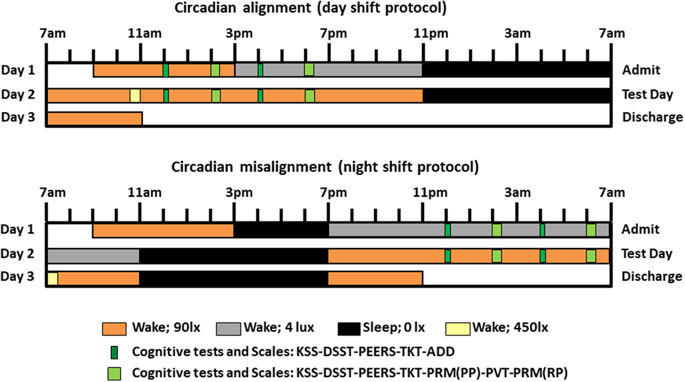Scientific Reports ( IF 3.8 ) Pub Date : 2019-01-24 , DOI: 10.1038/s41598-018-36762-w Sarah L Chellappa 1, 2 , Christopher J Morris 1, 2 , Frank A J L Scheer 1, 2

|
Shift work is associated with increased human operational errors, presumably due to the circadian timing system that inhibits optimal cognitive function during the night. Circadian misalignment, which is the misalignment between the circadian pacemaker and behavioral/environmental cycles, impairs cognitive performance in non-shift workers. However, it remains uncertain whether the adverse cognitive consequences of circadian misalignment are also observed in chronic shift workers. Thus, we investigated the effects of circadian misalignment on cognitive performance in chronic shift workers. Using a randomized, cross-over design that simulated day shift work (circadian alignment) and night shift work (circadian misalignment), we show that circadian misalignment increases cognitive vulnerability on sustained attention, information processing and visual-motor performance, particularly after more than 10 hours of scheduled wakefulness. Furthermore, their increased levels of subjective sleepiness and their decreased sleep efficiency were significantly associated with impaired sustained attention and visual-motor performance. Our data suggest that circadian misalignment dramatically deteriorates cognitive performance in chronic shift workers under circadian misalignment. This increased cognitive vulnerability may have important safety consequences, given the increasing number of nighttime jobs that crucially rely on the availability of cognitive resources.
中文翻译:

昼夜节律偏差对慢性轮班工人认知的影响。
轮班工作与增加的人为操作错误有关,大概是由于昼夜节律系统抑制了夜间的最佳认知功能。昼夜节律失调是昼夜节律起搏器与行为/环境周期之间的失调,损害了非轮班工人的认知能力。但是,尚不确定在慢性轮班工人中是否还观察到了昼夜节律偏差的不利认知后果。因此,我们调查了昼夜节律对慢性轮班工人认知表现的影响。通过使用随机,交叉设计模拟日班工作(昼夜节律排列)和夜班工作(昼夜节律排列),我们发现,昼夜节律排列会在持续关注的情况下增加认知脆弱性,信息处理和视觉运动表现,尤其是在计划的清醒超过10个小时之后。此外,他们的主观嗜睡水平提高和睡眠效率降低与持续注意力和视觉运动能力受损显着相关。我们的数据表明,在昼夜节律下,昼夜节律会严重恶化慢性轮班工人的认知能力。鉴于越来越多的夜间工作越来越关键地依赖于认知资源的可用性,因此这种认知能力的提高可能会带来重要的安全后果。它们的主观嗜睡水平增加和睡眠效率降低与持续注意力和视觉运动能力受损显着相关。我们的数据表明,在昼夜节律下,昼夜节律会严重恶化慢性轮班工人的认知能力。鉴于越来越多的夜间工作越来越关键地依赖于认知资源的可用性,因此这种认知能力的提高可能会带来重要的安全后果。它们的主观嗜睡水平增加和睡眠效率降低与持续注意力和视觉运动能力受损显着相关。我们的数据表明,在昼夜节律下,昼夜节律会严重恶化慢性轮班工人的认知能力。鉴于越来越多的夜间工作越来越关键地依赖于认知资源的可用性,因此这种认知能力的提高可能会带来重要的安全后果。

































 京公网安备 11010802027423号
京公网安备 11010802027423号